As the year draws to a close and the album release schedule slows down, we’re reminded of how much music there was to keep up with in 2023. This year saw many artists make bold artistic moves, whether by honing in their style or departing from it entirely; indie acts that have been generating hype for years finally broke through, veterans delivered some of their most compelling material to date, and the boundaries of pop seemed more fluid than ever – and that’s before we get to the shoegaze conversation. Most records on this list will challenge and even overwhelm you, while others will offer comfort long after the year is over; the ones that keep resonating will probably do a little bit of both. Here are the 50 best albums of 2023.
50. DJ Sabrina the Teenage DJ, Destiny
 Whichever way you cut it, Destiny is a lot. Even by DJ Sabrina the Teenage DJ’s standards – the pseudonymous London producer’s 2020 effort Charmed was three hours long – her latest is a daunting listen, clocking in at nearly four hours and jumping between styles, from lo-fi house to EDM to indietronica. I’ve listened to it in full maybe twice, and it’s weird to even consider it for a list like this, given how it treats the album as a uniquely malleable (and cinematic) form you can dip in and out of – but it is technically an album, and it’s one of the best of the year, so it belongs here. However you choose to take it in, Destiny is a sweeping experience where the reward is immediate but deeper investment is always welcome; its overwhelming rush of joy is driven by bountiful possibility but grounded in flashes of emotional vulnerability that keep you hooked. Like the voices that peek through it, Destiny stretches the limits of euphoria but invites you to really get lost in it.
Whichever way you cut it, Destiny is a lot. Even by DJ Sabrina the Teenage DJ’s standards – the pseudonymous London producer’s 2020 effort Charmed was three hours long – her latest is a daunting listen, clocking in at nearly four hours and jumping between styles, from lo-fi house to EDM to indietronica. I’ve listened to it in full maybe twice, and it’s weird to even consider it for a list like this, given how it treats the album as a uniquely malleable (and cinematic) form you can dip in and out of – but it is technically an album, and it’s one of the best of the year, so it belongs here. However you choose to take it in, Destiny is a sweeping experience where the reward is immediate but deeper investment is always welcome; its overwhelming rush of joy is driven by bountiful possibility but grounded in flashes of emotional vulnerability that keep you hooked. Like the voices that peek through it, Destiny stretches the limits of euphoria but invites you to really get lost in it.
49. Laurel Halo, Atlas
 Atlas is an album of vaporous, otherwordly beauty that, following a kind of dream logic, keeps pulling you in and slipping out of consciousness at the same time. It combines Laurel Halo’s childhood love for the piano, an instrument she reconnected with during a residency at the Ina-GRM Studios in Paris, with her unique sensibilities as a sound collagist, fusing and filtering minimalist piano sketches through various synthetic textures. Though it features appearances from Coby Sey, cellist Lucy Railton, violinist James Underwood, and experimental saxophonist Bendik Giske, the music swirls and pulses and swells like a one-person orchestra, each layer as blurry as the feeling it evokes, disarming and diaphanous yet tenderly affecting. You can never quite place it – maybe it spreads like the dissociating ambiance of a dark room, or the dissonance of staring at an old photo then yourself in the mirror, or blending into your surroundings on a late-night walk – but it finds you, one way or another, aching not to melt out of focus.
Atlas is an album of vaporous, otherwordly beauty that, following a kind of dream logic, keeps pulling you in and slipping out of consciousness at the same time. It combines Laurel Halo’s childhood love for the piano, an instrument she reconnected with during a residency at the Ina-GRM Studios in Paris, with her unique sensibilities as a sound collagist, fusing and filtering minimalist piano sketches through various synthetic textures. Though it features appearances from Coby Sey, cellist Lucy Railton, violinist James Underwood, and experimental saxophonist Bendik Giske, the music swirls and pulses and swells like a one-person orchestra, each layer as blurry as the feeling it evokes, disarming and diaphanous yet tenderly affecting. You can never quite place it – maybe it spreads like the dissociating ambiance of a dark room, or the dissonance of staring at an old photo then yourself in the mirror, or blending into your surroundings on a late-night walk – but it finds you, one way or another, aching not to melt out of focus.
48. Snõõper, Super Snõõper
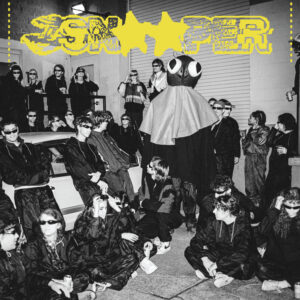 Part of what makes Snõõper’s approach as a punk band so unique is the way they combine some of the members’ hardcore background with a wild playfulness that not only extends to, but is largely centered around, their live show, which incorporates mediums such as 8-bit animation and puppetry for a meticulously structured yet constantly evolving set. It’s that experience they set out to mirror on their debut full-length, Super Snõõper, released via Jack White’s Third Man Records. It’s impressive just how many ideas they pack in under 23 minutes, boasting an assemblage of styles that comes across as gleeful yet frantic, mangled yet precise, intense and extremely danceable at the same time. The whole time, it’s clear the thing Snõõper capitalize on isn’t chaos or aggression, but pure fun – even if it only funnels out as such at the very last second.
Part of what makes Snõõper’s approach as a punk band so unique is the way they combine some of the members’ hardcore background with a wild playfulness that not only extends to, but is largely centered around, their live show, which incorporates mediums such as 8-bit animation and puppetry for a meticulously structured yet constantly evolving set. It’s that experience they set out to mirror on their debut full-length, Super Snõõper, released via Jack White’s Third Man Records. It’s impressive just how many ideas they pack in under 23 minutes, boasting an assemblage of styles that comes across as gleeful yet frantic, mangled yet precise, intense and extremely danceable at the same time. The whole time, it’s clear the thing Snõõper capitalize on isn’t chaos or aggression, but pure fun – even if it only funnels out as such at the very last second.
Read our Artist Spotlight interview with Snõõper.
47. Bonnie ‘Prince’ Billy, Keeping Secrets Will Destroy You
 Keeping Secrets Will Destroy You might seem like an ominous title for an album of such simple, homespun beauty. The quiet domesticity that permeated Will Oldham’s last solo album as Bonnie ‘Prince’ Billy, 2019’s I Made a Place, can be heard at the root of the new songs, but they wear their lessons with proud and penetrating ease, less prone to guard and puzzle. They’re bare-bones, soft, and raw even when embellished by strings, horns, and backing vocals, taking their time to unwind slowly, as if to exist this way is our only salvation against destructive forces both beyond and very much in our control. The songs on Keeping Secrets Will Destroy You have no choice but to live in an apocalypse, but in the you there also lives an us: if I share these and you pass them around, we might make something of our doomed time.
Keeping Secrets Will Destroy You might seem like an ominous title for an album of such simple, homespun beauty. The quiet domesticity that permeated Will Oldham’s last solo album as Bonnie ‘Prince’ Billy, 2019’s I Made a Place, can be heard at the root of the new songs, but they wear their lessons with proud and penetrating ease, less prone to guard and puzzle. They’re bare-bones, soft, and raw even when embellished by strings, horns, and backing vocals, taking their time to unwind slowly, as if to exist this way is our only salvation against destructive forces both beyond and very much in our control. The songs on Keeping Secrets Will Destroy You have no choice but to live in an apocalypse, but in the you there also lives an us: if I share these and you pass them around, we might make something of our doomed time.
46. Corinne Bailey Rae, Black Rainbows
 Corinne Bailey Rae’s fourth album, Black Rainbows, sounds like the sort of artistic rebirth you might call a revelation. Had André 3000 not released a flute album, it might have been the year’s most surprising left-turn, sharply eschewing the artist’s success in the easy listening realm as it glides through everything from blistering punk to forward-thinking R&B to avant-garde jazz. Far from a shallow experiment, though, it’s an audacious and astonishing album that feels liberating in meaningful and personal ways, inspired by the Stony Island Arts Bank in Chicago, an exhibition on Black history curated by artist Theaster Gates. Its bold, sprawling nature seems to be a direct result of, and in conversation with, the art she witnessed there, pushing her to explore the possibilities of her music – whether by innovating within the styles she’s long operated in, experimenting with electronics, or calling back to her musical beginnings in a riot grrl group. She may have initially envisioned Black Rainbows as a side project, but the freedom and confidence it generated has led to a major step forward.
Corinne Bailey Rae’s fourth album, Black Rainbows, sounds like the sort of artistic rebirth you might call a revelation. Had André 3000 not released a flute album, it might have been the year’s most surprising left-turn, sharply eschewing the artist’s success in the easy listening realm as it glides through everything from blistering punk to forward-thinking R&B to avant-garde jazz. Far from a shallow experiment, though, it’s an audacious and astonishing album that feels liberating in meaningful and personal ways, inspired by the Stony Island Arts Bank in Chicago, an exhibition on Black history curated by artist Theaster Gates. Its bold, sprawling nature seems to be a direct result of, and in conversation with, the art she witnessed there, pushing her to explore the possibilities of her music – whether by innovating within the styles she’s long operated in, experimenting with electronics, or calling back to her musical beginnings in a riot grrl group. She may have initially envisioned Black Rainbows as a side project, but the freedom and confidence it generated has led to a major step forward.
45. Oneohtrix Point Never, Again
 Even when it expands into something grandiose, Oneohtrix Point Never’s music can feel endlessly interior. It’s also part of what Daniel Lopatin has called “a world of inter-referentiality.” His work can be sonically challenging in a vacuum, but it can also feel alienating as a continuously evolving interrogation of the history of the project itself. His new album, Again, is billed as a “speculative autobiography,” the final installment in a trilogy of albums that includes 2015’s Garden of Delete and 2020’s Magic Oneohtrix Point Never. But when it comes to drawing from the music of his past, Again goes a little farther than those records by leaning into a kind of youthful naivety, treating the space where cluelessness and optimism meet as a kind of magical playground. The results are less conceptually grounded and more meandering, but still hypnotically replete with elements of beauty and surprise.
Even when it expands into something grandiose, Oneohtrix Point Never’s music can feel endlessly interior. It’s also part of what Daniel Lopatin has called “a world of inter-referentiality.” His work can be sonically challenging in a vacuum, but it can also feel alienating as a continuously evolving interrogation of the history of the project itself. His new album, Again, is billed as a “speculative autobiography,” the final installment in a trilogy of albums that includes 2015’s Garden of Delete and 2020’s Magic Oneohtrix Point Never. But when it comes to drawing from the music of his past, Again goes a little farther than those records by leaning into a kind of youthful naivety, treating the space where cluelessness and optimism meet as a kind of magical playground. The results are less conceptually grounded and more meandering, but still hypnotically replete with elements of beauty and surprise.
44. Liv.e, Girl in the Half Pearl
 Liv.e cooks up so many ideas on Girl in the Half Pearl that it’s hard to wrap your mind around. But sink into it and the Los Angeles-based artist’s shapeshifting, mercurial sound reveals itself as the product of both careful construction and introspection, an honest portrayal of rebirth and inner turmoil that can never quite extricate the two. Melding alternative R&B, lo-fi hip-hop, and jazz into its soupy chaos, the record allows itself to get tangled up in complexity but never strays from its core ethos, using its experimentation to unbottle the difficult corners of heartbreak, grief, and insecurity. It’s rare for a record so sonically adventurous to sound like an internal monologue rather than a soundscape of indistinct personality. “When I looked inside myself/ I found there was no one to help/ Guess I’ll find my super power/ Light by fire in the darkest hour,” Liv.e sings on opener ‘Gardetto.’, daring you to do the same.
Liv.e cooks up so many ideas on Girl in the Half Pearl that it’s hard to wrap your mind around. But sink into it and the Los Angeles-based artist’s shapeshifting, mercurial sound reveals itself as the product of both careful construction and introspection, an honest portrayal of rebirth and inner turmoil that can never quite extricate the two. Melding alternative R&B, lo-fi hip-hop, and jazz into its soupy chaos, the record allows itself to get tangled up in complexity but never strays from its core ethos, using its experimentation to unbottle the difficult corners of heartbreak, grief, and insecurity. It’s rare for a record so sonically adventurous to sound like an internal monologue rather than a soundscape of indistinct personality. “When I looked inside myself/ I found there was no one to help/ Guess I’ll find my super power/ Light by fire in the darkest hour,” Liv.e sings on opener ‘Gardetto.’, daring you to do the same.
43. Slowdive, everything is alive
 In many ways, Slowdive’s self-titled reunion album was their most successful statement yet, a reclamation of their legacy that managed to retain and invigorate the timeless magic of their music. Six years later, the album’s maximalist tendencies don’t just seem joyously triumphant, but a means of amplifying the hazy, sensual logic their songs always had, adding depth and density to their evocative soundscapes. On its follow-up, they employ a similar approach to a sound that’s more uniformly intimate and sparse. Compared to the frayed minimalism of an album like Pygmalion, it’s attuned to the ambient blur of grief, melancholy, and wonder but refines it intο a light-filled and, true to its name, vital record. What’s ultimately most astounding about everything is alive is that it feels like a journey as fantastic, but not necessarily tied to, that of the band itself, ringing with truth and intensity even – or especially – as the details begin to fade.
In many ways, Slowdive’s self-titled reunion album was their most successful statement yet, a reclamation of their legacy that managed to retain and invigorate the timeless magic of their music. Six years later, the album’s maximalist tendencies don’t just seem joyously triumphant, but a means of amplifying the hazy, sensual logic their songs always had, adding depth and density to their evocative soundscapes. On its follow-up, they employ a similar approach to a sound that’s more uniformly intimate and sparse. Compared to the frayed minimalism of an album like Pygmalion, it’s attuned to the ambient blur of grief, melancholy, and wonder but refines it intο a light-filled and, true to its name, vital record. What’s ultimately most astounding about everything is alive is that it feels like a journey as fantastic, but not necessarily tied to, that of the band itself, ringing with truth and intensity even – or especially – as the details begin to fade.
42. Slow Pulp, Yard
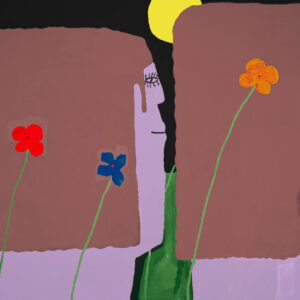 After recording their 2019 debut Moveys remotely during the pandemic, Slow Pulp opted to do the same on Yard, their gauzy, confident, and endlessly comforting sophomore full-length. The album showcases a band capable of switching between loud, intoxicating indie rock songs and soft, quietly affecting ones – what’s remarkable is that they so clearly share the same heart. Grappling with anxious isolation as much as it benefits from collaboration, it finds Emily Massey pushing her vocal limits while continuing to express self-doubt around different facets of her life. “Am I wrong?/ Or is it okay to stay inside and out of love?/ Tell me I’m wrong/ I’m just gonna give it a try and hope that it’s enough,” she sings on ‘Broadview’. All over Yard, you can feel the sun burning, and you can feel the love slipping through. Those questions don’t go away, but the feeling is infectious.
After recording their 2019 debut Moveys remotely during the pandemic, Slow Pulp opted to do the same on Yard, their gauzy, confident, and endlessly comforting sophomore full-length. The album showcases a band capable of switching between loud, intoxicating indie rock songs and soft, quietly affecting ones – what’s remarkable is that they so clearly share the same heart. Grappling with anxious isolation as much as it benefits from collaboration, it finds Emily Massey pushing her vocal limits while continuing to express self-doubt around different facets of her life. “Am I wrong?/ Or is it okay to stay inside and out of love?/ Tell me I’m wrong/ I’m just gonna give it a try and hope that it’s enough,” she sings on ‘Broadview’. All over Yard, you can feel the sun burning, and you can feel the love slipping through. Those questions don’t go away, but the feeling is infectious.
Read our Artist Spotlight interview with Slow Pulp.
41. Allegra Krieger, I Keep My Feet On the Fragile Plane
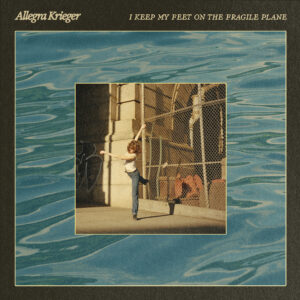 On her fourth record and first for Double Double Whammy, I Keep My Feet On the Fragile Plane, Allegra Krieger hones in her sharp-eyed songwriting to observe the rushing, paradoxical nature of day-to-day life with a mix of groundedness and mysticism. The New York singer-songwriter’s music has always been attuned to the constant cycle of beginnings and endings, but here, working again with producer Luke Temple, she finds comfort and levity in the idea of a “fragile plane,” which she describes as “a middle ground in the universe,” gracefully elevating small moments with subtle, evocative orchestration. “Everything’s leaving just as it’s coming in/ Nothing in this world ever stays still,” she sings, inviting us not to linger, but take stock of what does as we move along with the tides.
On her fourth record and first for Double Double Whammy, I Keep My Feet On the Fragile Plane, Allegra Krieger hones in her sharp-eyed songwriting to observe the rushing, paradoxical nature of day-to-day life with a mix of groundedness and mysticism. The New York singer-songwriter’s music has always been attuned to the constant cycle of beginnings and endings, but here, working again with producer Luke Temple, she finds comfort and levity in the idea of a “fragile plane,” which she describes as “a middle ground in the universe,” gracefully elevating small moments with subtle, evocative orchestration. “Everything’s leaving just as it’s coming in/ Nothing in this world ever stays still,” she sings, inviting us not to linger, but take stock of what does as we move along with the tides.
Read our Artist Spotlight interview with Allegra Krieger.
40. Jeff Rosenstock, HELLMODE
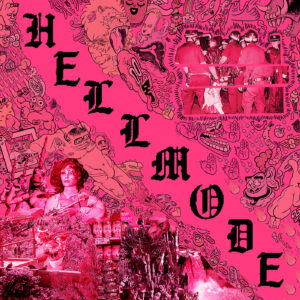 HELLMODE might be the first Jeff Rosenstock album to get a proper promotional cycle, but you don’t need a press quote to figure out it’s all about battling existential dread. First off: HELLMODE. Secondly, it’s a Jeff Rosenstock record, which means it serves as an attempt to take honest stock of his life and channel the kind of anxiety that never sticks to a single form; “the constant chaos keeps a brain a-rattlin’,” as he puts it on ‘GRAVEYARD SONG’. Reuniting with producer Jack Shirley to record the album at Hollywood’s EastWest Studios, where System of a Down laid down Toxicity, HELLMODE is as raw, furious, and anthemic as you might expect, but it’s also one of the loveliest and most affecting efforts Rosenstock has put out under his name. He’s still intent on releasing pent-up frustration in ways that urge you to sing along, but leaves more space for tender intimacy before each burst of catharsis.
HELLMODE might be the first Jeff Rosenstock album to get a proper promotional cycle, but you don’t need a press quote to figure out it’s all about battling existential dread. First off: HELLMODE. Secondly, it’s a Jeff Rosenstock record, which means it serves as an attempt to take honest stock of his life and channel the kind of anxiety that never sticks to a single form; “the constant chaos keeps a brain a-rattlin’,” as he puts it on ‘GRAVEYARD SONG’. Reuniting with producer Jack Shirley to record the album at Hollywood’s EastWest Studios, where System of a Down laid down Toxicity, HELLMODE is as raw, furious, and anthemic as you might expect, but it’s also one of the loveliest and most affecting efforts Rosenstock has put out under his name. He’s still intent on releasing pent-up frustration in ways that urge you to sing along, but leaves more space for tender intimacy before each burst of catharsis.
39. MSPAINT, Post-American
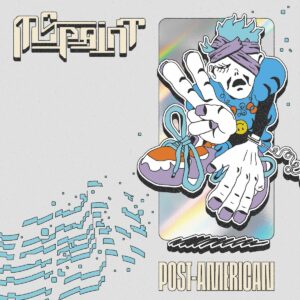 Having met each other through the local punk and hardcore scenes, the members of MSPAINT decided to form a band based on a simple premise: making music with no guitars. The irony was that most of them had previously occupied the role of the guitar player; the challenge was not having it sound like any rock band ditching guitars on their post-apocalyptic eighth album. Their debut LP, Post-American, co-produced by Militarie Gun’s Ian Shelton, does away with preconceptions around hardcore by blending elements of synth-punk, hip-hop, metal, and straight-up pop. Though brimming with grim, dystopian imagery that’s meant to hold a mirror up to society, it’s an infectious, invigorating album that maintains hope for a future that feels just as possible – not looming on the horizon so much as hovering at the edges of the reality we already live in.
Having met each other through the local punk and hardcore scenes, the members of MSPAINT decided to form a band based on a simple premise: making music with no guitars. The irony was that most of them had previously occupied the role of the guitar player; the challenge was not having it sound like any rock band ditching guitars on their post-apocalyptic eighth album. Their debut LP, Post-American, co-produced by Militarie Gun’s Ian Shelton, does away with preconceptions around hardcore by blending elements of synth-punk, hip-hop, metal, and straight-up pop. Though brimming with grim, dystopian imagery that’s meant to hold a mirror up to society, it’s an infectious, invigorating album that maintains hope for a future that feels just as possible – not looming on the horizon so much as hovering at the edges of the reality we already live in.
Read our Artist Spotlight interview with MSPAINT.
38. André 3000, New Blue Sun
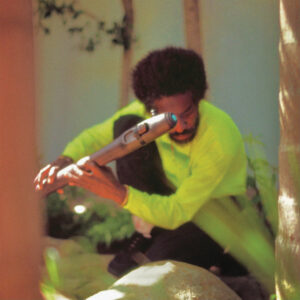 Nothing could have truly prepared us for an 87-minute flute album from André 3000, and he’s self-aware about it. When I saw the song titles on the LP, which opens with ‘I Swear, I Really Wanted to Make a ‘Rap’ Album but This Is Literally the Way the Wind Blew Me This Time’, I was worried André might be too self-aware and literal to really go where the music leads him – that it would take its clear reverence for new age, jazz, and ambient a little too lightly and too abstractly to be used as an expressive tool. That’s not the case. New Blue Sun is playful, but it’s also intuitive, deeply devotional, and delicately sincere in its emotionality; the framing is just a necessary excuse for the musicians to probe and teeter on. It’s not exactly a breeze to get through, but it’s a wondrous album that floats by pretty gently. For a record with so many expectations piled onto it, it’s unprovocative in a way that feels freeing, but never quite unassuming.
Nothing could have truly prepared us for an 87-minute flute album from André 3000, and he’s self-aware about it. When I saw the song titles on the LP, which opens with ‘I Swear, I Really Wanted to Make a ‘Rap’ Album but This Is Literally the Way the Wind Blew Me This Time’, I was worried André might be too self-aware and literal to really go where the music leads him – that it would take its clear reverence for new age, jazz, and ambient a little too lightly and too abstractly to be used as an expressive tool. That’s not the case. New Blue Sun is playful, but it’s also intuitive, deeply devotional, and delicately sincere in its emotionality; the framing is just a necessary excuse for the musicians to probe and teeter on. It’s not exactly a breeze to get through, but it’s a wondrous album that floats by pretty gently. For a record with so many expectations piled onto it, it’s unprovocative in a way that feels freeing, but never quite unassuming.
37. feeble little horse, Girl With Fish
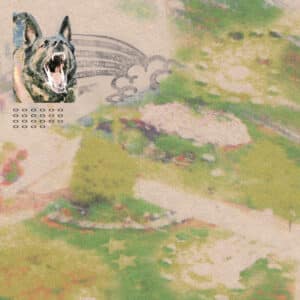 Girl with Fish is the sophomore LP from Pittsburgh’s feeble little horse, and it turns the intriguing qualities of 2022’s Hayday into something altogether mesmerizing. Unlike similarly-minded indie acts, the band doesn’t search for the sweet spot between hooky melodies and ambitious experimentation; stickiness is their whole deal, whether it comes in the form of something delicate, fuzzy, or idiosyncratic. Their synergy warps and mangles and compresses a swathe of influences until they’re barely identifiable, but the musical and emotional dynamics are laid out in such a way that it leaves you with something to latch onto. There’s a mix of humour and vulnerability in bassist/vocalist Lydia Slocum’s lyrics, which perfectly match the playful chaos of the music. Sometimes, it seems to suggest, it’s more fun to just get lost in the maze.
Girl with Fish is the sophomore LP from Pittsburgh’s feeble little horse, and it turns the intriguing qualities of 2022’s Hayday into something altogether mesmerizing. Unlike similarly-minded indie acts, the band doesn’t search for the sweet spot between hooky melodies and ambitious experimentation; stickiness is their whole deal, whether it comes in the form of something delicate, fuzzy, or idiosyncratic. Their synergy warps and mangles and compresses a swathe of influences until they’re barely identifiable, but the musical and emotional dynamics are laid out in such a way that it leaves you with something to latch onto. There’s a mix of humour and vulnerability in bassist/vocalist Lydia Slocum’s lyrics, which perfectly match the playful chaos of the music. Sometimes, it seems to suggest, it’s more fun to just get lost in the maze.
36. The Clientele, I Am Not There Anymore
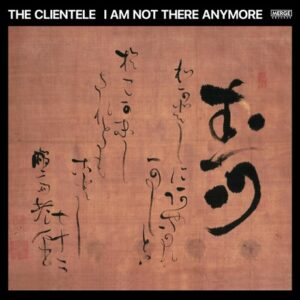 “All the beautiful things are opaque,” Alasdair MacLean sings on ‘Lady Grey’, a shimmering highlight from the Clientele’s astonishing new double LP I Am Not There Anymore. The stories on the album don’t cohere in any clear or narratively revelatory way, but the beauty that pervades it – haunting, surreal, inexplicable – reveals itself through recurring images, signs, and symbols that feel persistent and strangely resonant. “What happened with this record was that we bought a computer,” MacLean has said, and beyond electronic instrumentation, they also fold in spoken-word passages, minimalist piano instrumentals, and string and horn arrangements across its 63-minute runtime. For all its dazzling scope, the Clientele immerse us in the sonic, emotional, and geographic landscape of I Am Not There Anymore so fervently that it immediately feels both out of time and close to home, like an echo of a memory that only gets bigger and more elaborate the further away you get from it.
“All the beautiful things are opaque,” Alasdair MacLean sings on ‘Lady Grey’, a shimmering highlight from the Clientele’s astonishing new double LP I Am Not There Anymore. The stories on the album don’t cohere in any clear or narratively revelatory way, but the beauty that pervades it – haunting, surreal, inexplicable – reveals itself through recurring images, signs, and symbols that feel persistent and strangely resonant. “What happened with this record was that we bought a computer,” MacLean has said, and beyond electronic instrumentation, they also fold in spoken-word passages, minimalist piano instrumentals, and string and horn arrangements across its 63-minute runtime. For all its dazzling scope, the Clientele immerse us in the sonic, emotional, and geographic landscape of I Am Not There Anymore so fervently that it immediately feels both out of time and close to home, like an echo of a memory that only gets bigger and more elaborate the further away you get from it.
Read our inspirations interview with the Clientele.
35. Westerman, An Inbuilt Fault
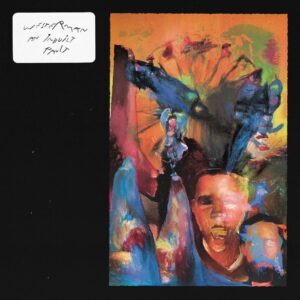 Westerman recorded his debut album, Your Hero Is Not Dead, in Portugal and London with his friend and producer Nathan Jenkins (aka Bullion), who helped move his intricate folk sound in a more textural direction. After spending much of the pandemic in Italy working on demos by himself, Westerman decided to go to Los Angeles to lay down his sophomore LP, An Inbuilt Fault. Co-produced alongside Big Thief’s James Krivchenia, the record sets his inquisitive and often ambiguous songwriting against vibrant and fluidly adventurous arrangements that place emphasis on both complex grooves and the primacy of the human voice. Even in the fragmented blur of a lot of these songs, a sense of hopeful sincerity and tenderness seeps through Westerman’s gorgeous, intimate music.
Westerman recorded his debut album, Your Hero Is Not Dead, in Portugal and London with his friend and producer Nathan Jenkins (aka Bullion), who helped move his intricate folk sound in a more textural direction. After spending much of the pandemic in Italy working on demos by himself, Westerman decided to go to Los Angeles to lay down his sophomore LP, An Inbuilt Fault. Co-produced alongside Big Thief’s James Krivchenia, the record sets his inquisitive and often ambiguous songwriting against vibrant and fluidly adventurous arrangements that place emphasis on both complex grooves and the primacy of the human voice. Even in the fragmented blur of a lot of these songs, a sense of hopeful sincerity and tenderness seeps through Westerman’s gorgeous, intimate music.
Read our Artist Spotlight interview with Westerman.
34. Sofia Kourtesis, Madres
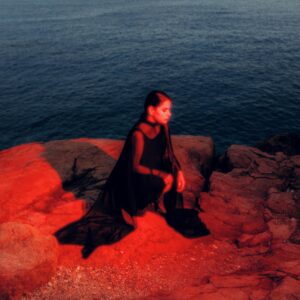 In the past, Sofia Kourtesis has leaned away from dance music as a form of escape and towards evoking a sense of nostalgia for home, even as she stretched the definition of the word beyond the literal place where she grew up. The Peruvian-born, Berlin-based artist favours vulnerability over the perfect rigidity and intellectualism that marks the genre, and her work on Madres, richly textured and meticulously crafted as it is, is above all emotionally complex. Complex not just in its range of emotion – though there is certainly more of that than you would expect from a glistening and infectious set of dance tracks – but in the way it tends toward joy as something intimate, radical, curiously malleable, and teeming with history. In trying to contain it, Kourtesis’ songs remain autobiographical but venture further than she ever has before, sharpening her ear as a storyteller, curator, and sound collagist.
In the past, Sofia Kourtesis has leaned away from dance music as a form of escape and towards evoking a sense of nostalgia for home, even as she stretched the definition of the word beyond the literal place where she grew up. The Peruvian-born, Berlin-based artist favours vulnerability over the perfect rigidity and intellectualism that marks the genre, and her work on Madres, richly textured and meticulously crafted as it is, is above all emotionally complex. Complex not just in its range of emotion – though there is certainly more of that than you would expect from a glistening and infectious set of dance tracks – but in the way it tends toward joy as something intimate, radical, curiously malleable, and teeming with history. In trying to contain it, Kourtesis’ songs remain autobiographical but venture further than she ever has before, sharpening her ear as a storyteller, curator, and sound collagist.
33. Slaughter Beach, Dog, Crying, Laughing, Waving, Smiling
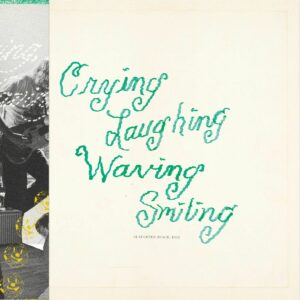 Around the making of Crying, Laughing, Waving, Smiling, Jake Ewald was particularly fascinated by artists who have managed to whittle down a life’s worth of memory and experience into an emotionally resonant piece of work, one of whose simplicity often belies just how enormous of a task that is. Ewald’s own writing feels instinctual, generous, and nuanced, and though it’s delivered with growing awareness, he admits he didn’t immediately realize when his attempts with Slaughter Beach, Dog tended towards something similarly wide-encompassing, if still ambiguous, like on the 9-minute single ‘Engine’. The album floats beautifully from one song to the next, giving each character and story the space to exist and reasons to hold onto them. They’re never the same for everyone, but no matter where it hits you, it’s a kind of featherlight marvel.
Around the making of Crying, Laughing, Waving, Smiling, Jake Ewald was particularly fascinated by artists who have managed to whittle down a life’s worth of memory and experience into an emotionally resonant piece of work, one of whose simplicity often belies just how enormous of a task that is. Ewald’s own writing feels instinctual, generous, and nuanced, and though it’s delivered with growing awareness, he admits he didn’t immediately realize when his attempts with Slaughter Beach, Dog tended towards something similarly wide-encompassing, if still ambiguous, like on the 9-minute single ‘Engine’. The album floats beautifully from one song to the next, giving each character and story the space to exist and reasons to hold onto them. They’re never the same for everyone, but no matter where it hits you, it’s a kind of featherlight marvel.
Read our inspirations interview with Slaughter Beach, Dog
32. Hotline TNT, Cartwheel
 Hotline TNT’s debut album, Nineteen in Love, arrived in 2021, initially as one long YouTube video whose description read: “Cancel your Spotify subscription.” Will Anderson carries that DIY ethos onto its its follow-up, Cartwheel; he plays and sings almost every note on the LP, which was recorded in two sessions – one with Ian Teeple, and one with Aron Kobayashi Ritch. In combining his knack for pop hooks with surging guitars and subtle production tricks, Hotline TNT feels akin to the recent wave of bands putting a modern twist on shoegaze, but rather than drowning in a wash of noise, Cartwheel sounds as relentlessly dizzying as it is warm, blurry yet cathartic, stacking up distorted riffs and emotion in the hope – or even just the possibility – that love will triumph in the end. “There’s a lot in this song/ That’s not in my diary,” Anderson sings on ‘History Channel’, and one way or another, it makes itself known.
Hotline TNT’s debut album, Nineteen in Love, arrived in 2021, initially as one long YouTube video whose description read: “Cancel your Spotify subscription.” Will Anderson carries that DIY ethos onto its its follow-up, Cartwheel; he plays and sings almost every note on the LP, which was recorded in two sessions – one with Ian Teeple, and one with Aron Kobayashi Ritch. In combining his knack for pop hooks with surging guitars and subtle production tricks, Hotline TNT feels akin to the recent wave of bands putting a modern twist on shoegaze, but rather than drowning in a wash of noise, Cartwheel sounds as relentlessly dizzying as it is warm, blurry yet cathartic, stacking up distorted riffs and emotion in the hope – or even just the possibility – that love will triumph in the end. “There’s a lot in this song/ That’s not in my diary,” Anderson sings on ‘History Channel’, and one way or another, it makes itself known.
Read our Artist Spotlight interview with Hotline TNT.
31. Sampha, Lahai
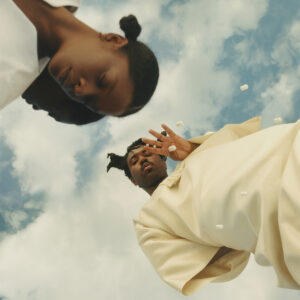 “We’ve both dealt with loss and grief in separate ways/ On the same track running,” Sampha admits on ‘Jonathan L. Seagull (JLS)’, a track named after Richard Bach’s 1970 novella about a bird’s pursuit of perfect flight. It’s safe to say that for him, it was largely through the making of his Mercury Prize-winning debut album, 2017’s Process, which came out in the aftermath of his mother’s death, pairing gorgeously textured arrangements with soul-baring lyricism. Although Process was both deeply meditative and sonically kinetic, its follow-up homes in on those qualities while being more outwardly concerned with his connection with the ones around him, a connection he describes as art. Bach is also referenced on the single ‘Spirit 2.0’, which starts out luscious and fluttering until Sampha cracks it open, enraptured by a sense of total freedom and peace; he’s on a free-fall, drifting out of time, because he knows the wings of his people are there to catch him.
“We’ve both dealt with loss and grief in separate ways/ On the same track running,” Sampha admits on ‘Jonathan L. Seagull (JLS)’, a track named after Richard Bach’s 1970 novella about a bird’s pursuit of perfect flight. It’s safe to say that for him, it was largely through the making of his Mercury Prize-winning debut album, 2017’s Process, which came out in the aftermath of his mother’s death, pairing gorgeously textured arrangements with soul-baring lyricism. Although Process was both deeply meditative and sonically kinetic, its follow-up homes in on those qualities while being more outwardly concerned with his connection with the ones around him, a connection he describes as art. Bach is also referenced on the single ‘Spirit 2.0’, which starts out luscious and fluttering until Sampha cracks it open, enraptured by a sense of total freedom and peace; he’s on a free-fall, drifting out of time, because he knows the wings of his people are there to catch him.
30. Water From Your Eyes, Everyone’s Crushed
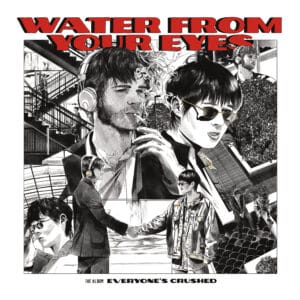 Water From Your Eyes’ fifth record, 2021’s Structure, brought their knack for hooks, mangled experiments, abstract lyricism, and playful sincerity together and closer to the fore. It’s a balance they continue to toy with and perfect on Everyone’s Crushed, their first LP since signing to Matador. “I’m ready to throw you up,” Brown sings on ’14’, which you might hear as off, because that’s exactly what the album keeps doing – the songs twist and tease and tie themselves into a knot until you almost can’t stomach it, but it’s the same chaos that feeds you, so you can’t help but come back. Throw you off as they might, there’s real tenderness and beauty there, and it’s all as thrilling as it is violently, inescapably funny.
Water From Your Eyes’ fifth record, 2021’s Structure, brought their knack for hooks, mangled experiments, abstract lyricism, and playful sincerity together and closer to the fore. It’s a balance they continue to toy with and perfect on Everyone’s Crushed, their first LP since signing to Matador. “I’m ready to throw you up,” Brown sings on ’14’, which you might hear as off, because that’s exactly what the album keeps doing – the songs twist and tease and tie themselves into a knot until you almost can’t stomach it, but it’s the same chaos that feeds you, so you can’t help but come back. Throw you off as they might, there’s real tenderness and beauty there, and it’s all as thrilling as it is violently, inescapably funny.
Read our Artist Spotlight interview with Water From Your Eyes.
29. Indigo De Souza, All of This Will End
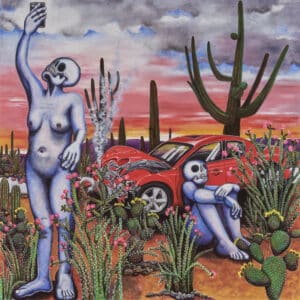 The title of Indigo De Souza’s latest album is a pure statement of fact: All of This Will End. Depending on your frame of mind, it scans as either totally defeatist or life-affirming, and the Asheville, NC singer-songwriter doesn’t point in any one direction – simply gestures at the preciousness of everything and, in her music, traces how it moves through her body. De Souza wrote the follow-up to 2021’s Any Shape You Take during a transitional period while detaching herself from a toxic community, and by the time she went back into the studio, she was surrounded by safer, kinder, and more loving people who became a source of inspiration all their own. Like her previous albums, it’s driven by raw intensity and emotional dynamics that can get pretty messy, but it’s also filled with unwavering conviction for the things that matter, and for the importance of growing with them.
The title of Indigo De Souza’s latest album is a pure statement of fact: All of This Will End. Depending on your frame of mind, it scans as either totally defeatist or life-affirming, and the Asheville, NC singer-songwriter doesn’t point in any one direction – simply gestures at the preciousness of everything and, in her music, traces how it moves through her body. De Souza wrote the follow-up to 2021’s Any Shape You Take during a transitional period while detaching herself from a toxic community, and by the time she went back into the studio, she was surrounded by safer, kinder, and more loving people who became a source of inspiration all their own. Like her previous albums, it’s driven by raw intensity and emotional dynamics that can get pretty messy, but it’s also filled with unwavering conviction for the things that matter, and for the importance of growing with them.
Read our inspirations interview with Indigo De Souza.
28. Mandy, Indiana, i’ve seen a way
 Treading the line between the playful and violent, Mandy Indiana’s 2021 … EP balanced militaristic grooves with formless, visceral experimentation, paving the way for the band’s debut full-length, i’ve seen a way. They recorded parts of the album in bizarre, unconventional locales – screaming vocals in a shopping centre, live drums in a cave in the West Country. One session even took place in a Gothic crypt while a yoga class was underway just above them, a sort of literal manifestation of their disruptive, even combative approach to creating dissonance. But the real battle is happening within the music, as Caulfield, singing in her native French, infuses the amorphous chaos that buzzes through the record with fiery intent. Mandy, Indiana fashion a world of discomfort that pulls you further in the more you try to turn away, all while ensuring the view they project is no more grim than galvanizing.
Treading the line between the playful and violent, Mandy Indiana’s 2021 … EP balanced militaristic grooves with formless, visceral experimentation, paving the way for the band’s debut full-length, i’ve seen a way. They recorded parts of the album in bizarre, unconventional locales – screaming vocals in a shopping centre, live drums in a cave in the West Country. One session even took place in a Gothic crypt while a yoga class was underway just above them, a sort of literal manifestation of their disruptive, even combative approach to creating dissonance. But the real battle is happening within the music, as Caulfield, singing in her native French, infuses the amorphous chaos that buzzes through the record with fiery intent. Mandy, Indiana fashion a world of discomfort that pulls you further in the more you try to turn away, all while ensuring the view they project is no more grim than galvanizing.
Read our Artist Spotlight interview with Mandy, Indiana.
27. Samia, Honey
 “Somebody stop me,” Samia begs as she walks into the middle of the party, overcome by the sudden urge to write a poem. Her striking 2020 debut The Baby was praised for its unflinchingly honesty and confessional style of writing, but Samia knows how easily those same qualities can be perceived as excruciating. Honey throws a lot at you – it’s not the 1975 levels of baffling versatility, but it’s closer to that than the introspective songwriters she was initially compared to. Not only does Samia double down on both vulnerability and playfulness, but rather than always trying to reconcile the two, she makes her torn ambivalence the central conceit of the album, which mostly alternates between searing ballads and gentle indie pop cuts. If The Baby was seamless and elegant in its expression of overwhelming emotions, Honey allows itself to be messier and a bit more careless, and its resonance is amplified the more you settle into its uneven perspective.
“Somebody stop me,” Samia begs as she walks into the middle of the party, overcome by the sudden urge to write a poem. Her striking 2020 debut The Baby was praised for its unflinchingly honesty and confessional style of writing, but Samia knows how easily those same qualities can be perceived as excruciating. Honey throws a lot at you – it’s not the 1975 levels of baffling versatility, but it’s closer to that than the introspective songwriters she was initially compared to. Not only does Samia double down on both vulnerability and playfulness, but rather than always trying to reconcile the two, she makes her torn ambivalence the central conceit of the album, which mostly alternates between searing ballads and gentle indie pop cuts. If The Baby was seamless and elegant in its expression of overwhelming emotions, Honey allows itself to be messier and a bit more careless, and its resonance is amplified the more you settle into its uneven perspective.
26. Youth Lagoon, Heaven Is a Junkyard
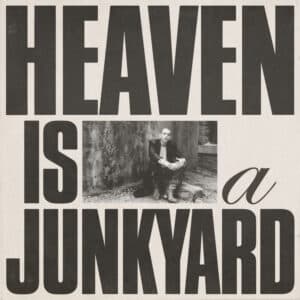 When Trevor Powers first started working on his next Youth Lagoon album, it felt like nothing was snapping into place. Then, in October 2021, he suffered a severe reaction to an over-the-counter medication he took for a minor stomach ache that nearly cost him his voice. It was a chaotic and terrifying time in his life that, in addition to fostering a deeper appreciation for home, the people around him, and God, carried such spiritual weight that it pushed him to confront the fear that was choking up his creativity. On Heaven Is a Junkyard, he applies this renewed perspective to peer into the haunted beauty of his small-town surroundings, blurring and melding with his own internal landscape in ways that feel not muddled or weightless, but revelatory and – once again, or rather still – comforting.
When Trevor Powers first started working on his next Youth Lagoon album, it felt like nothing was snapping into place. Then, in October 2021, he suffered a severe reaction to an over-the-counter medication he took for a minor stomach ache that nearly cost him his voice. It was a chaotic and terrifying time in his life that, in addition to fostering a deeper appreciation for home, the people around him, and God, carried such spiritual weight that it pushed him to confront the fear that was choking up his creativity. On Heaven Is a Junkyard, he applies this renewed perspective to peer into the haunted beauty of his small-town surroundings, blurring and melding with his own internal landscape in ways that feel not muddled or weightless, but revelatory and – once again, or rather still – comforting.
Read our inspirations interview with Youth Lagoon.
25. Andy Shauf, Norm
 When he started working on his new album, Andy Shauf thought the songs might not even be connected this time. It would be a more conventional collection – normal, even – thus, Norm. The record ended up having a lot more in common with his previous albums, sketching out scenes for his characters to figure out how they relate to one another. Partly because of how the songs were conceived, however, and partly due to the influences he was exposed to, Shauf also found himself exploring new and interesting ideas, both musically and conceptually. Some things are immediately obvious, others take time to sink in. On the surface, the songs are pleasant and hazy, but there’s something much darker lurking underneath. Follow along and you’ll be rewarded with an intimate journey where each storyline ultimately comes together while still leaving things eerily open, like a dream.
When he started working on his new album, Andy Shauf thought the songs might not even be connected this time. It would be a more conventional collection – normal, even – thus, Norm. The record ended up having a lot more in common with his previous albums, sketching out scenes for his characters to figure out how they relate to one another. Partly because of how the songs were conceived, however, and partly due to the influences he was exposed to, Shauf also found himself exploring new and interesting ideas, both musically and conceptually. Some things are immediately obvious, others take time to sink in. On the surface, the songs are pleasant and hazy, but there’s something much darker lurking underneath. Follow along and you’ll be rewarded with an intimate journey where each storyline ultimately comes together while still leaving things eerily open, like a dream.
Read our track-by-track interview with Shauf.
24. Yaeji, With a Hammer

With a Hammer slips into unknowable territory. Yaeji’s past work has done that too; the Korean-American artist’s 2020 mixtape What We Drew, her first for the storied UK label XL, veered away from the club-oriented dance music of previous releases and into something more ambient, introspective, and diffuse. Even as her musical instincts once again guide her in different directions, her debut album, like What We Drew, chronicles the push-and-pull between anxiety and confidence, community and solitude, weaving catharsis out of the most uncertain corners of that internalized space. Take the lead single ‘For Granted’, whose emotional core – fluctuating as it does between sincere gratitude and unease around the unexpected goodness of her life – feels like such a continuation of the reflections on What We Drew that it feels wrong to call With a Hammer a departure. It’s only a different, more solidified kind of arrival, one that still stirs up more questions than it answers.
23. Olivia Rodrigo, GUTS
 “I want it to be, like, messy,” Olivia Rodrigo declared a few seconds into her debut album SOUR, abruptly replacing the orchestral strings that open ‘brutal’ with a jagged alt-rock riff. At its best, it wasn’t, like, but really messy – achingly honest in ways that made you forget about the polish and theatricality behind the craft, enough to keep up its sometimes shaky momentum. On its follow-up, Rodrigo sounds less concerned with making an impression or playing a range of different parts, instead highlighting both the nuance and rawness of her songwriting. It’s exacting and stronger in its messiness – more intentional about each shift in dynamics – but also convincingly volatile, risky, and playful. Throughout, Rodrigo is witty, self-aware, bored, tormented, and delirious. The tug-of-war of emotions, confusing and relatable as it may be, isn’t just an inevitable consequence of growing up; it’s part of the fun.
“I want it to be, like, messy,” Olivia Rodrigo declared a few seconds into her debut album SOUR, abruptly replacing the orchestral strings that open ‘brutal’ with a jagged alt-rock riff. At its best, it wasn’t, like, but really messy – achingly honest in ways that made you forget about the polish and theatricality behind the craft, enough to keep up its sometimes shaky momentum. On its follow-up, Rodrigo sounds less concerned with making an impression or playing a range of different parts, instead highlighting both the nuance and rawness of her songwriting. It’s exacting and stronger in its messiness – more intentional about each shift in dynamics – but also convincingly volatile, risky, and playful. Throughout, Rodrigo is witty, self-aware, bored, tormented, and delirious. The tug-of-war of emotions, confusing and relatable as it may be, isn’t just an inevitable consequence of growing up; it’s part of the fun.
22. Joanna Sternberg, I’ve Got Me
 The title of Joanna Sternberg’s sophomore album, which follows 2019’s Then I Try Some More, sounds like another knotty yet defiant self-affirmation: I’ve Got Me. They wrote and played every instrument on its 12 tracks, including guitar, double bass, cello, violin, piano, and more, and enlisted producer Matt Sweeney and engineer Daniel Schlett to record the album at Brooklyn’s Strange Weather Studios. Though it varies in mood and style, the music remains idiosyncratic, stripped-down, and piercingly self-reflective, even when the dynamics they describe are blurry and difficult to pin down. Its delicate tone feels like a careful balancing act: the lyrics are striking in ways that feel both timeless and specific, relatable and profound, while their voice, carrying so much of the weight, can sound weary, comforting, heartbroken, or resolute. The space it occupies might be uncompromisingly intimate, but Sternberg makes sure to reserve a place for everyone.
The title of Joanna Sternberg’s sophomore album, which follows 2019’s Then I Try Some More, sounds like another knotty yet defiant self-affirmation: I’ve Got Me. They wrote and played every instrument on its 12 tracks, including guitar, double bass, cello, violin, piano, and more, and enlisted producer Matt Sweeney and engineer Daniel Schlett to record the album at Brooklyn’s Strange Weather Studios. Though it varies in mood and style, the music remains idiosyncratic, stripped-down, and piercingly self-reflective, even when the dynamics they describe are blurry and difficult to pin down. Its delicate tone feels like a careful balancing act: the lyrics are striking in ways that feel both timeless and specific, relatable and profound, while their voice, carrying so much of the weight, can sound weary, comforting, heartbroken, or resolute. The space it occupies might be uncompromisingly intimate, but Sternberg makes sure to reserve a place for everyone.
Read our Artist Spotlight interview with Joanna Sternberg.
21. Yo La Tengo, This Stupid World
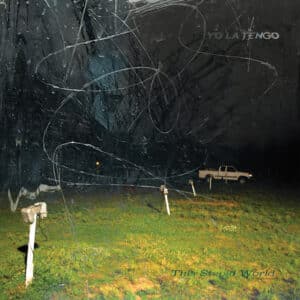 Four decades into their career, Yo La Tengo have such a sprawling and versatile discography that it’s no surprise their most beloved records, from 1997’s I Can Feel The Heart Beating As One to 2013’s Fade, are ones that make an effort to streamline their sound while eloquently fusing different styles. Aside from it being their first album of wholly new material since 2018’s There’s a Riot Going On, that’s another reason why This Stupid World feels like another pivotal moment in a career full of them. On paper, a lot of This Stupid World sounds doomful, or at least weathered by the passage of time. But more often than not, it’s a record that’s thrilling in its aliveness: “This stupid world, it’s killing me,” goes its enveloping mantra. “This stupid world is all we have.”
Four decades into their career, Yo La Tengo have such a sprawling and versatile discography that it’s no surprise their most beloved records, from 1997’s I Can Feel The Heart Beating As One to 2013’s Fade, are ones that make an effort to streamline their sound while eloquently fusing different styles. Aside from it being their first album of wholly new material since 2018’s There’s a Riot Going On, that’s another reason why This Stupid World feels like another pivotal moment in a career full of them. On paper, a lot of This Stupid World sounds doomful, or at least weathered by the passage of time. But more often than not, it’s a record that’s thrilling in its aliveness: “This stupid world, it’s killing me,” goes its enveloping mantra. “This stupid world is all we have.”
20. Jessie Ware, That! Feels Good!
 “Just remember: Pleasure is a right!” Jessie Ware shouts on the title track of her new album, which could just as well have served as the tagline for 2020’s revelatory What’s Your Pleasure? The “just remember” is as important as the declaration itself: That! Feels Good! is an emphatic reminder to hold onto the ethos she embraced on that album, part of a wave of pop records firmly rooted in the euphoric possibilities of dance music – a happy coincidence when people most needed it. Her decision to explore disco was, in her own words, “purely selfish,” and on That! Feels Good! she not only steps deeper into the dancefloor but a little further outside of herself. “Is this my life?/ Beginning or end?/ Can I start again?/ Can we start again?” she sings on the immaculate ‘Begin Again’. It sounds more and more like an invitation than an existential conundrum, and with all that new light pouring in, you’d be a fool not to give it a chance.
“Just remember: Pleasure is a right!” Jessie Ware shouts on the title track of her new album, which could just as well have served as the tagline for 2020’s revelatory What’s Your Pleasure? The “just remember” is as important as the declaration itself: That! Feels Good! is an emphatic reminder to hold onto the ethos she embraced on that album, part of a wave of pop records firmly rooted in the euphoric possibilities of dance music – a happy coincidence when people most needed it. Her decision to explore disco was, in her own words, “purely selfish,” and on That! Feels Good! she not only steps deeper into the dancefloor but a little further outside of herself. “Is this my life?/ Beginning or end?/ Can I start again?/ Can we start again?” she sings on the immaculate ‘Begin Again’. It sounds more and more like an invitation than an existential conundrum, and with all that new light pouring in, you’d be a fool not to give it a chance.
19. yeule, softscars
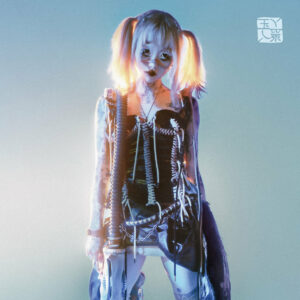 It’s one thing to expose yourself, and another to be seen; one thing to be immortalized and another to be remembered. As much as yeule’s music tears into the vast space between the human and the artificial, it also magnifies those imperceptibly different shades of experience, the kinds that can make or break a body, making them feel infinite. “Feels like shit/ When you read me/ Like you all know,” yeule sang on ‘Eyes’, a track from their phenomenal 2022 album Glitch Princess that twisted its gentleness into something ominous and self-erasing. On some of the most memorable moments of their thrilling new LP softscars, though, they preserve not only its beauty, but the warmth and intimacy of an honest gaze that’s capable of piercing through the deepest depression. The Singaporean singer-songwriter’s output used to scan like a portal to a fractured, digitized interior world, but it’s sounding more and more like a vehicle for looking through and holding out for each other.
It’s one thing to expose yourself, and another to be seen; one thing to be immortalized and another to be remembered. As much as yeule’s music tears into the vast space between the human and the artificial, it also magnifies those imperceptibly different shades of experience, the kinds that can make or break a body, making them feel infinite. “Feels like shit/ When you read me/ Like you all know,” yeule sang on ‘Eyes’, a track from their phenomenal 2022 album Glitch Princess that twisted its gentleness into something ominous and self-erasing. On some of the most memorable moments of their thrilling new LP softscars, though, they preserve not only its beauty, but the warmth and intimacy of an honest gaze that’s capable of piercing through the deepest depression. The Singaporean singer-songwriter’s output used to scan like a portal to a fractured, digitized interior world, but it’s sounding more and more like a vehicle for looking through and holding out for each other.
18. Kara Jackson, Why Does the Earth Give Us People to Love?
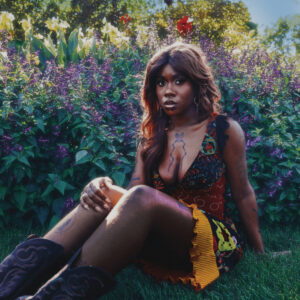 Why Does the Earth Give Us People to Love?, the follow-up to Kara Jackson’s stripped-back EP A Song for Every Chamber of the Heart, grew out of a collection of demos the Chicago singer-songwriter recorded in her childhood bedroom in the early days of the pandemic. With help from a group of musicians including NNAMDÏ, Sen Morimoto, and KAINA, she refined them into a candid, tender, and audacious LP that confronts overwhelming emotions around grief and love without smoothing them over. Yet the loneliness in her music is a rare kind – one that nurtures her internal contradictions, finding ways to be humorous and playful and fierce as a means of sustaining, if not warding off, suffering. In its honest specificity, you’re reminded of the things we share, all worth the light of day.
Why Does the Earth Give Us People to Love?, the follow-up to Kara Jackson’s stripped-back EP A Song for Every Chamber of the Heart, grew out of a collection of demos the Chicago singer-songwriter recorded in her childhood bedroom in the early days of the pandemic. With help from a group of musicians including NNAMDÏ, Sen Morimoto, and KAINA, she refined them into a candid, tender, and audacious LP that confronts overwhelming emotions around grief and love without smoothing them over. Yet the loneliness in her music is a rare kind – one that nurtures her internal contradictions, finding ways to be humorous and playful and fierce as a means of sustaining, if not warding off, suffering. In its honest specificity, you’re reminded of the things we share, all worth the light of day.
Read our Artist Spotlight interview with Kara Jackson.
17. Ratboys, The Window
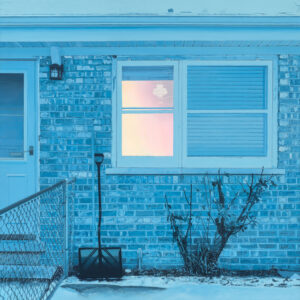 Ratboys’ 2020 LP Printer’s Devil marked the first time the group’s current lineup – Julia Steiner, David Sagan, Sean Neumann, and Marcus Nuccio – wrote an album collaboratively from start to finish, though the entirety of their first headline tour was then cancelled due to COVID. For their fifth studio album, the Chicago band recruited producer Chris Walla, who helped realize the widescreen ambition of their tenderly infectious and heartfelt brand of so-called “post-country.” Though The Window deals with themes of grief and isolation, the music’s joyful aliveness radiates through not only the band’s tight performances but Steiner’s lyrics, whose unflinching honesty and immediacy spins the white noise of confusion into pure love. “I love this feeling,” she sings looking back on the band’s early days on ‘I Want You (2010)’. “Burning all my blank CDs never meant so much to me.” In the present, it somehow still feels like the start of forever.
Ratboys’ 2020 LP Printer’s Devil marked the first time the group’s current lineup – Julia Steiner, David Sagan, Sean Neumann, and Marcus Nuccio – wrote an album collaboratively from start to finish, though the entirety of their first headline tour was then cancelled due to COVID. For their fifth studio album, the Chicago band recruited producer Chris Walla, who helped realize the widescreen ambition of their tenderly infectious and heartfelt brand of so-called “post-country.” Though The Window deals with themes of grief and isolation, the music’s joyful aliveness radiates through not only the band’s tight performances but Steiner’s lyrics, whose unflinching honesty and immediacy spins the white noise of confusion into pure love. “I love this feeling,” she sings looking back on the band’s early days on ‘I Want You (2010)’. “Burning all my blank CDs never meant so much to me.” In the present, it somehow still feels like the start of forever.
Read our Artist Spotlight interview with Ratboys.
16. Kali Uchis, Red Moon in Venus
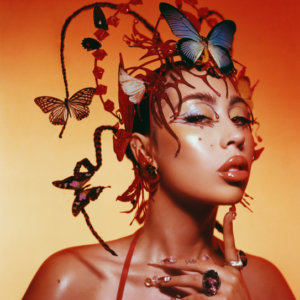 Kali Uchis’ music conjures a world of fantastical intimacy, and she knows how to tease us in. While the intro to her triumphant 2018 debut, Isolation, extended over two minutes, carrying an air of mystery and escapism, the track that opens her third album, Red Moon in Venus, is shorter but just as efficient: “I just wanted to tell you, in case you forgot/ I love you,” she intones, enveloped by twinkling synths, chirping crickets, and birdsong. Across the next fourteen tracks, Uchis remains firmly committed to that proclamation of love, even as it pushes her sound in different directions. Though more conceptually focused than Isolation and building on the promise of its Spanish-language follow-up Sin Miedo (del Amor y Otros Demonios) ∞, the way the album revels in different shades of devotion makes for a lavish, enchanting journey.
Kali Uchis’ music conjures a world of fantastical intimacy, and she knows how to tease us in. While the intro to her triumphant 2018 debut, Isolation, extended over two minutes, carrying an air of mystery and escapism, the track that opens her third album, Red Moon in Venus, is shorter but just as efficient: “I just wanted to tell you, in case you forgot/ I love you,” she intones, enveloped by twinkling synths, chirping crickets, and birdsong. Across the next fourteen tracks, Uchis remains firmly committed to that proclamation of love, even as it pushes her sound in different directions. Though more conceptually focused than Isolation and building on the promise of its Spanish-language follow-up Sin Miedo (del Amor y Otros Demonios) ∞, the way the album revels in different shades of devotion makes for a lavish, enchanting journey.
15. Nicole Dollanganger, Married in Mount Airy
 In the lead-up to her last album, 2018’s Heart Shaped Bed, Nicole Dollanganger visited the Poconos and was struck by how “everything is love-based, but it’s broken down and destroyed”; the abandoned motel as a metaphor for doomed love was something she’d already soaked in. Despite the unusually long wait between albums, Married in Mount Airy seems to pick up where that record left off, as if the paradox kept coming back to haunt her. In Dollanganger’s music, love and eroticism have always been inextricable from violence and pain. They get tied up in bleak, gruesome, and often ambiguous ways, but Dollanganger is careful not to veer into exploitation. Her remarkable new album goes one step further, avoiding explicit descriptions in favour of vague yet searing lyrics that amplify both the power and horror that permeates them.
In the lead-up to her last album, 2018’s Heart Shaped Bed, Nicole Dollanganger visited the Poconos and was struck by how “everything is love-based, but it’s broken down and destroyed”; the abandoned motel as a metaphor for doomed love was something she’d already soaked in. Despite the unusually long wait between albums, Married in Mount Airy seems to pick up where that record left off, as if the paradox kept coming back to haunt her. In Dollanganger’s music, love and eroticism have always been inextricable from violence and pain. They get tied up in bleak, gruesome, and often ambiguous ways, but Dollanganger is careful not to veer into exploitation. Her remarkable new album goes one step further, avoiding explicit descriptions in favour of vague yet searing lyrics that amplify both the power and horror that permeates them.
14. ANOHNI and the Johnsons, My Back Was a Bridge for You to Cross
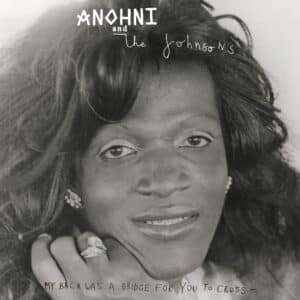 The subject matter of Anohni’s songwriting is most often heavy, tragic, and inescapable. Which is why one of the most striking things about My Back Was a Bridge for You to Cross – which follows her 2016 masterpiece HOPELESSNESS and marks her first release bearing the Johnsons moniker in over a decade – is how she’s able to carry it with such remarkable lightness. Co-produced with Jimmy Hogarth, the album contains some of her loosest, most organic, and grounded material to date – terms not usually associated with the artist’s consistent and mountainous acclaim. Guitars chime softly against Anohni’s aching, desperate voice on ‘It Must Change’, which communicates the depths of her grief while flickering in spirit between personal and environmental catastrophe. “No one’s getting out of here/ That’s why this is so sad,” Anohni sings, and the band keeps working to articulate, without really trying to transform or define, that pure emotion tearing at its core.
The subject matter of Anohni’s songwriting is most often heavy, tragic, and inescapable. Which is why one of the most striking things about My Back Was a Bridge for You to Cross – which follows her 2016 masterpiece HOPELESSNESS and marks her first release bearing the Johnsons moniker in over a decade – is how she’s able to carry it with such remarkable lightness. Co-produced with Jimmy Hogarth, the album contains some of her loosest, most organic, and grounded material to date – terms not usually associated with the artist’s consistent and mountainous acclaim. Guitars chime softly against Anohni’s aching, desperate voice on ‘It Must Change’, which communicates the depths of her grief while flickering in spirit between personal and environmental catastrophe. “No one’s getting out of here/ That’s why this is so sad,” Anohni sings, and the band keeps working to articulate, without really trying to transform or define, that pure emotion tearing at its core.
13. Kelela, Raven
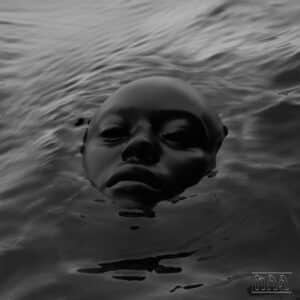 Kelela’s music has always been flooded in layers. But while the artful, forward-thinking nature of her alternative R&B has been the center of discussion ever since she broke out with the 2013 mixtape Cut 4 Me, what renders her approach so unique has just as much to do with the intricate ways in which she directs emotional attention. “I really want to be sexy in a nuanced way,” she said in an interview, and her commitment to that goal – and the implicit belief that those physical and emotional nuances are not only personal but shared among communities – imbues Raven with a vivid sense of purpose. The hour-long record is her most deeply, if not fully, realized effort to date; “deeper than fantasy” is how she describes the love she sinks into, an ideal that grounds and reverberates through Raven even when it dips into more surreal territory.
Kelela’s music has always been flooded in layers. But while the artful, forward-thinking nature of her alternative R&B has been the center of discussion ever since she broke out with the 2013 mixtape Cut 4 Me, what renders her approach so unique has just as much to do with the intricate ways in which she directs emotional attention. “I really want to be sexy in a nuanced way,” she said in an interview, and her commitment to that goal – and the implicit belief that those physical and emotional nuances are not only personal but shared among communities – imbues Raven with a vivid sense of purpose. The hour-long record is her most deeply, if not fully, realized effort to date; “deeper than fantasy” is how she describes the love she sinks into, an ideal that grounds and reverberates through Raven even when it dips into more surreal territory.
12. L’Rain, I Killed Your Dog
 “You didn’t think this would come out of me,” Taja Cheek sings on ‘5 to 8 Hours (WWwaG)’, a highlight from her dazzling new album as L’Rain. It’s a fitting moment of self-awareness on a record full of them, as the Brooklyn singer-songwriter and multi-instrumentalist’s music tends to swirl with surprise; even if you’re familiar with the dizzyingly intricate collages on her first two albums, particularly 2021’s Fatigue, something about I Killed Your Dog will surely catch you off guard. Described by Cheek as both an “anti-break up” and her “basic bitch” record, it not only owns its contradictions but pushes them outward. The most surprising and even disarming aspect of I Killed Your Dog ultimately isn’t how eerie or fierce it is, but how warm and tender; not how heady or experimental, but how gracious it is in distilling and illuminating parts of ourselves that either seem tiny and insignificant to the outside world or too big and difficult to comprehend.
“You didn’t think this would come out of me,” Taja Cheek sings on ‘5 to 8 Hours (WWwaG)’, a highlight from her dazzling new album as L’Rain. It’s a fitting moment of self-awareness on a record full of them, as the Brooklyn singer-songwriter and multi-instrumentalist’s music tends to swirl with surprise; even if you’re familiar with the dizzyingly intricate collages on her first two albums, particularly 2021’s Fatigue, something about I Killed Your Dog will surely catch you off guard. Described by Cheek as both an “anti-break up” and her “basic bitch” record, it not only owns its contradictions but pushes them outward. The most surprising and even disarming aspect of I Killed Your Dog ultimately isn’t how eerie or fierce it is, but how warm and tender; not how heady or experimental, but how gracious it is in distilling and illuminating parts of ourselves that either seem tiny and insignificant to the outside world or too big and difficult to comprehend.
11. 파란노을 (Parannoul), After the Magic
 2021’s To See the Next Part of the Dream turned out to be an unexpected breakthrough for Parannoul, who fused bedroom pop and shoegaze into an overwhelming, singular experience. The one-man project out of Seoul remains anonymous but has since opened up to collaboration, with last year’s Paraglow EP, a joint release with Asian Glow, topping our list of the best EPs of 2022. Part of what makes After the Magic stand out is still its unyielding intensity, a testament to how huge, resonant, and enveloping music that’s made by one person with a computer can sound, and more importantly, feel. But by clearly refining their production and pulling from a different array of influences, these new songs achieve a different kind of impact: as opaque and murky as the feelings swirling around them can be, the whole album soars with resplendent warmth and optimism like it’s the only thing worth holding onto. You have to believe even if you can’t quite put a finger on it.
2021’s To See the Next Part of the Dream turned out to be an unexpected breakthrough for Parannoul, who fused bedroom pop and shoegaze into an overwhelming, singular experience. The one-man project out of Seoul remains anonymous but has since opened up to collaboration, with last year’s Paraglow EP, a joint release with Asian Glow, topping our list of the best EPs of 2022. Part of what makes After the Magic stand out is still its unyielding intensity, a testament to how huge, resonant, and enveloping music that’s made by one person with a computer can sound, and more importantly, feel. But by clearly refining their production and pulling from a different array of influences, these new songs achieve a different kind of impact: as opaque and murky as the feelings swirling around them can be, the whole album soars with resplendent warmth and optimism like it’s the only thing worth holding onto. You have to believe even if you can’t quite put a finger on it.
10. Yves Tumor, Praise a Lord Who Chews But Which Does Not Consume; (Or Simply, Hot Between Worlds)
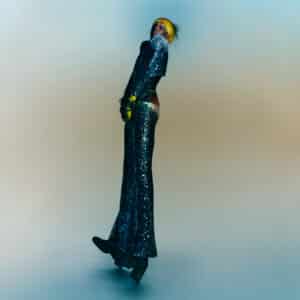 Yves Tumor has evolved from experimental sound collagist to glam-rock star, but even as they have become more “hook-focused,” as the artist told Courteny Love, the sensual, elusive, and divine qualities of their music remain at its core, interacting in rich and captivating ways. Praise a Lord is not a drastic shift from 2020’s gloriously theatrical Heaven to a Tortured Mind, but it carries its creator’s boundless vision with the same urgency. Tumor is a master of tension and release, and on Praise a Lord, they linger in the space between the two in a way that feels physical more than just explorative. The album doesn’t ache for any sort of godly destination, but it is transfixed by the potential for transformation, proving they’ll harness all the beauty and horror necessary to breathe life into each striking form.
Yves Tumor has evolved from experimental sound collagist to glam-rock star, but even as they have become more “hook-focused,” as the artist told Courteny Love, the sensual, elusive, and divine qualities of their music remain at its core, interacting in rich and captivating ways. Praise a Lord is not a drastic shift from 2020’s gloriously theatrical Heaven to a Tortured Mind, but it carries its creator’s boundless vision with the same urgency. Tumor is a master of tension and release, and on Praise a Lord, they linger in the space between the two in a way that feels physical more than just explorative. The album doesn’t ache for any sort of godly destination, but it is transfixed by the potential for transformation, proving they’ll harness all the beauty and horror necessary to breathe life into each striking form.
9. Amaarae, Fountain Baby
 On her sophomore album, Amaarae floats over lavish, genreless production with effortless ease. Inspired by her diverse upbringing – she’s lived between the Bronx, Atlanta, and Accra – and using her delicate, sultry voice as a malleable and thrillingly melodic instrument, she’s able to make her fusion of R&B, hip-hop, Afropop, and even punk feel as seamless as it is infectious, offering a refreshingly experimental take on global-minded pop. But neither the lifestyle nor the love she sings about is easy – sexual desire’s swaddled in frustration, inextricable from danger, and her vision of luxury dips into fantasy no matter how actualized it is. But the complexity of Fountain Baby, from its emotional dynamics to its musical alchemy, never comes at the cost of pop appeal. “I do what I want so I can get my way,” she proclaims on ‘Sex, Violence, Suicide’, which careens from dreamy ballad to a punk rager. No point pushing boundaries if you’re not having fun, and with all this space to indulge, she’s having it her way.
On her sophomore album, Amaarae floats over lavish, genreless production with effortless ease. Inspired by her diverse upbringing – she’s lived between the Bronx, Atlanta, and Accra – and using her delicate, sultry voice as a malleable and thrillingly melodic instrument, she’s able to make her fusion of R&B, hip-hop, Afropop, and even punk feel as seamless as it is infectious, offering a refreshingly experimental take on global-minded pop. But neither the lifestyle nor the love she sings about is easy – sexual desire’s swaddled in frustration, inextricable from danger, and her vision of luxury dips into fantasy no matter how actualized it is. But the complexity of Fountain Baby, from its emotional dynamics to its musical alchemy, never comes at the cost of pop appeal. “I do what I want so I can get my way,” she proclaims on ‘Sex, Violence, Suicide’, which careens from dreamy ballad to a punk rager. No point pushing boundaries if you’re not having fun, and with all this space to indulge, she’s having it her way.
8. Lana Del Rey, Did You Know That There’s a Tunnel Under Ocean Blvd

Lana Del Rey’s ninth LP is knotty and full of contradictions; she told Billie Eilish that the critically lauded Norman Fucking Rockwell! “was about world-building, whereas this was straight vibing,” and if that’s the case, the vibes are kind of all over the place. The 7-minute single ‘A&W’ served as a jarring ride through her various personas, and there’s a lot more to unpack as the record sprawls over 77 minutes. But the track and the album are similar in that they delicately balance wistful balladry with something playfully audacious and beat-driven. The real reason Ocean Blvd feels cohesive, though, is that it yearns for purpose in a way that not even Norman Fucking Rockwell! did, and it clings to the hope seeping through the cracks even when it’s not as resolute. For all the raw, unhinged desperation here, Del Rey finds striking ways to direct it toward reverence, empathy, and wonder.
7. boygenius, the record
 There’s music about intimacy, and then there’s music about intimacy between the people making it. boygenius songs have a way of being gut-punchingly honest no matter who they’re addressing, but the ones celebrating the bond between the trio – Julien Baker, Phoebe Bridgers, and Lucy Dacus – are bound to be a different kind of special. Their friendship felt so precious that when Dacus first came up with ‘We’re in Love’, a song whose first-person plural is entirely unambiguous, Baker was slightly mortified by the idea of making such earnestness public. “Damn, that makes me sad,” Dacus sings, characteristically reacting to her own imaginary scene. “If you rewrite your life, may I still play a part?” Of course, sadness alone doesn’t cut it. When it twists a knot in your stomach, a whole swirl of emotion’s caught up in there. the record, friendly soldier in waiting, will help you breathe it out.
There’s music about intimacy, and then there’s music about intimacy between the people making it. boygenius songs have a way of being gut-punchingly honest no matter who they’re addressing, but the ones celebrating the bond between the trio – Julien Baker, Phoebe Bridgers, and Lucy Dacus – are bound to be a different kind of special. Their friendship felt so precious that when Dacus first came up with ‘We’re in Love’, a song whose first-person plural is entirely unambiguous, Baker was slightly mortified by the idea of making such earnestness public. “Damn, that makes me sad,” Dacus sings, characteristically reacting to her own imaginary scene. “If you rewrite your life, may I still play a part?” Of course, sadness alone doesn’t cut it. When it twists a knot in your stomach, a whole swirl of emotion’s caught up in there. the record, friendly soldier in waiting, will help you breathe it out.
6. Julie Byrne, The Greater Wings
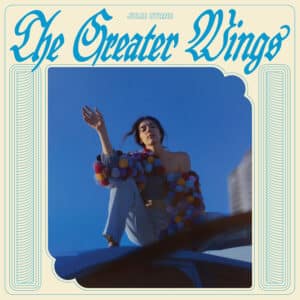 Julie Byrne began working on the follow-up to 2017’s Not Even Happiness in the fall of 2020, collaborating with her longtime creative partner Eric Littmann on sessions that extended through the spring of 2021. In June of 2021, Littmann died suddenly at age 31. In the wake of his loss, what would become The Greater Wings was shelved for six months, before it was completed in early 2022 with producer Alex Somers. She treats both the inanimate and human subjects of her songwriting with a divine sensitivity, seeking a connectedness that can turn a personal plea into a communal meditation. When it manifests, as in ‘Flare’, it serves as proof that music doesn’t need to carry us very far, so long as it simply does. By the end of the record, Byrne can only arrive at the greatest revelations with an “I guess,” but her truth, for once and still, seems to contain a whole universe: alive, timeless, and new.
Julie Byrne began working on the follow-up to 2017’s Not Even Happiness in the fall of 2020, collaborating with her longtime creative partner Eric Littmann on sessions that extended through the spring of 2021. In June of 2021, Littmann died suddenly at age 31. In the wake of his loss, what would become The Greater Wings was shelved for six months, before it was completed in early 2022 with producer Alex Somers. She treats both the inanimate and human subjects of her songwriting with a divine sensitivity, seeking a connectedness that can turn a personal plea into a communal meditation. When it manifests, as in ‘Flare’, it serves as proof that music doesn’t need to carry us very far, so long as it simply does. By the end of the record, Byrne can only arrive at the greatest revelations with an “I guess,” but her truth, for once and still, seems to contain a whole universe: alive, timeless, and new.
5. Mitski, The Land Is Inhospitable and So Are We
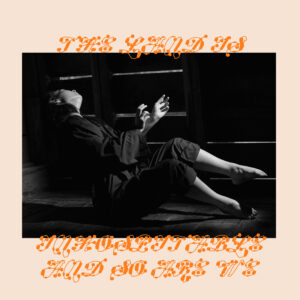 The Land Is Inhospitable and So Are We reads as a dramatic title, but stress the second to last word and you hear the beginning of a question. The songs on Mitski’s seventh album sound like that, too: bold yet tentative, elegant yet knotty, drawing you in with their organic beauty until you realize you’re stranded in the dark alongside her, wondering what awaits us. The follow-up to 2022’s Laurel Hell is both her warmest and most challenging effort to date – not even handing out the questions to you, let alone any answers, but moving with multitudes – and so the first to vividly capture the ostensible contradictions and chilling intricacies that have long been a mark of her songwriting. Though the songs don’t quite explode or follow conventional paths the way some of her older material did, this is the least detached Mitski has sounded. Even the most dissociative songs sound alive, making the loneliest thing burn brightly and beautifully.
The Land Is Inhospitable and So Are We reads as a dramatic title, but stress the second to last word and you hear the beginning of a question. The songs on Mitski’s seventh album sound like that, too: bold yet tentative, elegant yet knotty, drawing you in with their organic beauty until you realize you’re stranded in the dark alongside her, wondering what awaits us. The follow-up to 2022’s Laurel Hell is both her warmest and most challenging effort to date – not even handing out the questions to you, let alone any answers, but moving with multitudes – and so the first to vividly capture the ostensible contradictions and chilling intricacies that have long been a mark of her songwriting. Though the songs don’t quite explode or follow conventional paths the way some of her older material did, this is the least detached Mitski has sounded. Even the most dissociative songs sound alive, making the loneliest thing burn brightly and beautifully.
4. billy woods & Kenny Segal, Maps
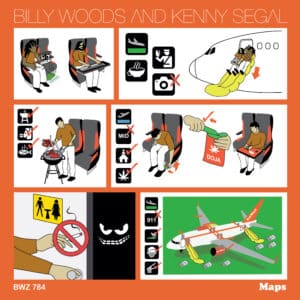 Even a cursory, breeze-through listen makes it clear billy woods has a lot to say on Maps. Line by line, there’s a strange pleasure in trying to untangle his knotted, artful rhymes and trace his shifts in perspective. But the album is especially fascinating considering the scope of his discography; conceptually, as a kind of travelogue, it veers away from last year’s Aethiopes and Church, two vastly different albums in their own right, but at the same time seems to follow the same fragmented, dream-like logic, which woods doesn’t so much rest in as attempt to rip into. For many like-minded artists, dense lyricism against dreary, diffuse instrumentals is a comfortable vibe; for woods, it’s a challenge to find comfort amidst the unsteadiness. His second full-length collaboration with producer Kenny Segal, Maps both warps and perfects his approach while pushing him to explore new territory.
Even a cursory, breeze-through listen makes it clear billy woods has a lot to say on Maps. Line by line, there’s a strange pleasure in trying to untangle his knotted, artful rhymes and trace his shifts in perspective. But the album is especially fascinating considering the scope of his discography; conceptually, as a kind of travelogue, it veers away from last year’s Aethiopes and Church, two vastly different albums in their own right, but at the same time seems to follow the same fragmented, dream-like logic, which woods doesn’t so much rest in as attempt to rip into. For many like-minded artists, dense lyricism against dreary, diffuse instrumentals is a comfortable vibe; for woods, it’s a challenge to find comfort amidst the unsteadiness. His second full-length collaboration with producer Kenny Segal, Maps both warps and perfects his approach while pushing him to explore new territory.
3. Sufjan Stevens, Javelin
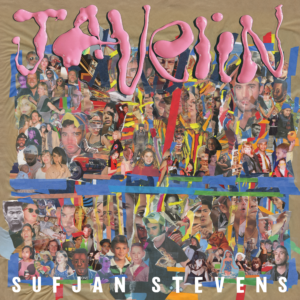 Javelin is billed as Stevens’ first album in “full singer-songwriter mode” since his 2015 masterpiece Carrie & Lowell, though it doesn’t exactly find him in the same mode. It’s his first proper solo album since 2020’s The Ascension, which married sparse melancholy with opulent synths in ways that drifted away from both the heartbreaking quietude of Carrie & Lowell and 2010’s freakier The Age of Adz. If you want to call Javelin a return to form, or a culmination of Stevens’ various approaches over the years, you could, as is often the case with a high watermark in an artist’s discography. But what is moving and even groundbreaking about the album is the way Stevens arranges these elements, not foregoing the existential questions that swaddled The Ascension but weaving them into a lush, approachable tapestry of sound. Oblivious as we might be to what it all means, running shorter and shorter on time, there’s nothing lonely about it. For Stevens, and for all of us inclined to listen, that says a whole lot.
Javelin is billed as Stevens’ first album in “full singer-songwriter mode” since his 2015 masterpiece Carrie & Lowell, though it doesn’t exactly find him in the same mode. It’s his first proper solo album since 2020’s The Ascension, which married sparse melancholy with opulent synths in ways that drifted away from both the heartbreaking quietude of Carrie & Lowell and 2010’s freakier The Age of Adz. If you want to call Javelin a return to form, or a culmination of Stevens’ various approaches over the years, you could, as is often the case with a high watermark in an artist’s discography. But what is moving and even groundbreaking about the album is the way Stevens arranges these elements, not foregoing the existential questions that swaddled The Ascension but weaving them into a lush, approachable tapestry of sound. Oblivious as we might be to what it all means, running shorter and shorter on time, there’s nothing lonely about it. For Stevens, and for all of us inclined to listen, that says a whole lot.
2. Caroline Polachek, Desire, I Want to Turn Into You

The intense longing at the core of Caroline Polachek’s debut album, Pang, has only deepened in the years since its release, but Desire, I Want to Turn Into You is framed as somewhat of a departure from that record. Looser, dirtier, and more bizarre, its metaphors hewing closer to the earth, it’s not any less cohesive than its predecessor, but the boundaries here are more porous and abstract, with sounds darting in all sorts of different directions. The fact that she allows herself to venture off the beaten path does nothing to detract from the emotions at play, though, which is the real miracle of Desire. There’s a physicality and vulnerability to the record as much as there is humour and surrealism – they’re all part of her “twisted, manic, cornucopeiac” vision.
1. Wednesday, Rat Saw God
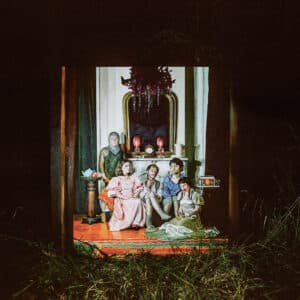 Rat Saw God, the follow-up to Twin Plagues and Wednesday’s Dead Oceans debut, is a triumph of razor-sharp focus, churning intensity, and natural ambition. By this point, the group is so in sync that it sounds like they’re carrying stimuli through the same nervous system while eliciting different responses. For all the darkness that the album digs into, what it drags along with it is never a lack of clarity. On the contrary, these mostly coming-of-age tales, lived or otherwise absorbed, seem to have sharpened so many human senses: Karly Hartzman is acutely aware of irony, especially as it pertains to religion, and, on songs like ‘Bull Believer’, fuses allegory and truth to striking effect. Her descriptions never feel overbearing or exaggerated, but heightened in their reality, zoning in on the blurry space between pain as an experience and tragedy as a story. The blood stays fresh on the page but the pain takes on different dimensions; comedy is an unintended consequence, not an antidote. It all blends together in ways that are immediate, glorious, and totally arresting.
Rat Saw God, the follow-up to Twin Plagues and Wednesday’s Dead Oceans debut, is a triumph of razor-sharp focus, churning intensity, and natural ambition. By this point, the group is so in sync that it sounds like they’re carrying stimuli through the same nervous system while eliciting different responses. For all the darkness that the album digs into, what it drags along with it is never a lack of clarity. On the contrary, these mostly coming-of-age tales, lived or otherwise absorbed, seem to have sharpened so many human senses: Karly Hartzman is acutely aware of irony, especially as it pertains to religion, and, on songs like ‘Bull Believer’, fuses allegory and truth to striking effect. Her descriptions never feel overbearing or exaggerated, but heightened in their reality, zoning in on the blurry space between pain as an experience and tragedy as a story. The blood stays fresh on the page but the pain takes on different dimensions; comedy is an unintended consequence, not an antidote. It all blends together in ways that are immediate, glorious, and totally arresting.
